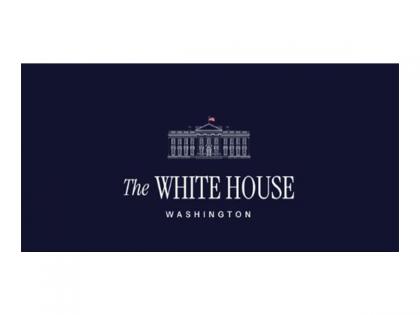White House announces US-Indonesia framework for Reciprocal Trade deal
By ANI | Updated: July 23, 2025 04:24 IST2025-07-23T04:17:21+5:302025-07-23T04:24:25+5:30
Washington [US], July 23 : The United States and the Republic of Indonesia have agreed to a framework for ...

White House announces US-Indonesia framework for Reciprocal Trade deal
Washington [US], July 23 : The United States and the Republic of Indonesia have agreed to a framework for negotiating an Agreement on Reciprocal Trade to strengthen bilateral economic ties, the White House said in a joint statement on Tuesday.
The agreement aims to provide both countries' exporters unprecedented access to each other's markets and builds upon the U.S.-Indonesia Trade and Investment Framework Agreement signed on July 16, 1996.
According to the statement released by the White House, "Indonesia will eliminate approximately 99 percent of tariff barriers for a full range of U.S. industrial and U.S. food and agricultural products exported to Indonesia."
It further added, "The United States will reduce to 19 percent the reciprocal tariffs, as set forth in Executive Order 14257 of April 2, 2025, on originating goods of Indonesia, and may also identify certain commodities that are not naturally available or domestically produced in the United States for a further reduction in the reciprocal tariff rate."
The White House also stated that the two countries will negotiate facilitative rules of origin to ensure that the benefits of the agreement accrue primarily to the United States and Indonesia.
The agreement will also address non-tariff barriers. As per the joint statement, "The United States and Indonesia will work together to address Indonesia's non-tariff barriers that affect bilateral trade and investment in priority areas, including exempting U.S. companies and originating goods from local content requirements; accepting vehicles built to U.S. federal motor vehicle safety and emissions standards; accepting FDA certificates and prior marketing authorizations for medical devices and pharmaceuticals; removing certain labeling requirements; exempting U.S. exports of cosmetics, medical devices, and other manufactured goods from certain requirements; taking steps to resolve many long-standing intellectual property issues identified in USTR's Special 301 Report; and addressing U.S. concerns with conformity assessment procedures."
The White House also noted that "Indonesia will work to address barriers for U.S. exports, including through the removal of import restrictions or licensing requirements on U.S. remanufactured goods or their parts; the elimination of pre-shipment inspection or verification requirements on imports of U.S. goods; and the adoption and implementation of good regulatory practices."
On agricultural cooperation, the statement said: "The United States and Indonesia have also committed to address and prevent barriers to U.S. food and agricultural products in the Indonesian market, including exempting U.S. food and agricultural products from all import licensing regimes, including commodity balance requirements; ensuring transparency and fairness with respect to geographical indications; providing permanent Fresh Food of Plant Origin (FFPO) designation for all applicable U.S. plant products; and recognizing U.S. regulatory oversight, including listing of all U.S. meat, poultry, and dairy facilities and accepting certificates issued by U.S. regulatory authorities."
Digital trade, labor rights, and environmental cooperation are also included in the framework. The White House added, "Indonesia has committed to address barriers impacting digital trade, services, and investment... Indonesia commits to eliminate existing HTS tariff lines on 'intangible products' and suspend related requirements on import declarations; to support a permanent moratorium on customs duties on electronic transmissions at the WTO... and to take effective actions to implement the Joint Initiative on Services Domestic Regulation."
Further, "Indonesia commits to protecting internationally recognized labor rights... adopt and implement a prohibition on the importation of goods produced by forced or compulsory labor; amend its labor laws... and strengthen enforcement of its labor laws," the statement said.
It also noted that "Indonesia commits to adopt and maintain high levels of environmental protection and to effectively enforce its environmental laws, including by taking measures to improve forest sector governance... and combat illegal, unreported, and unregulated fishing and illegal wildlife trade."
On industrial exports, the White House said, "Indonesia will remove restrictions on exports to the United States of industrial commodities, including critical minerals."
The countries have also pledged to enhance economic and national security cooperation: "The United States and Indonesia are committed to strengthening economic and national security cooperation to enhance supply chain resilience and innovation through complementary actions to address unfair trade practices of other countries, and through cooperation on export controls, investment security, and combatting duty evasion."
Additionally, the statement acknowledged upcoming commercial deals, including the "procurement of aircraft currently valued at 3.2 billion USD; purchase of agriculture products... with an estimated total value of 4.5 billion USD; and purchases of energy products... with an estimated value of 15 billion USD."
In the weeks ahead, "the United States and Indonesia will negotiate and finalize the Agreement on Reciprocal Trade, prepare the Agreement for signature, and undertake domestic formalities in advance of the Agreement entering into force," the White House concluded.
Disclaimer: This post has been auto-published from an agency feed without any modifications to the text and has not been reviewed by an editor
Open in app